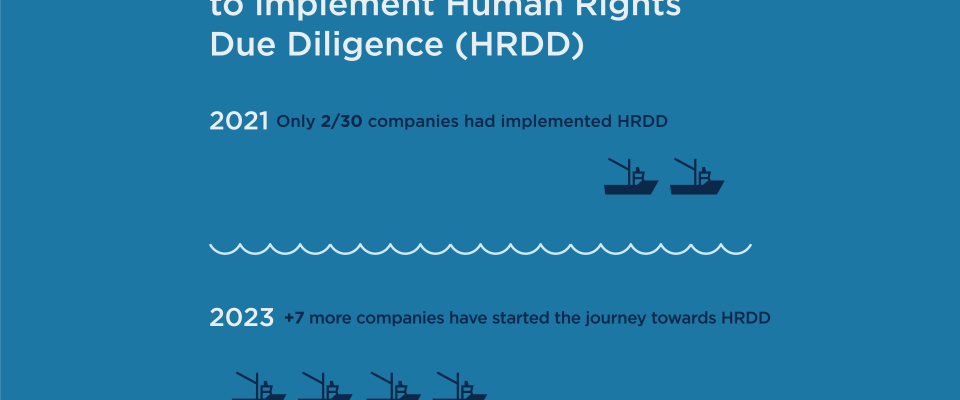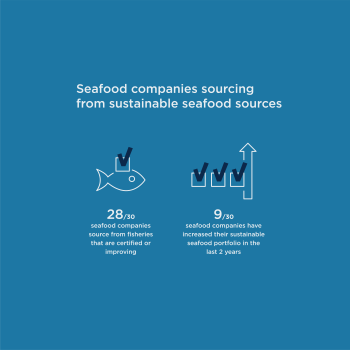Key finding
More companies taking first steps to address human rights risks

Since 2016, numerous reports, including a recent investigation by the Outlaw Ocean project, show that forced labour is widespread in the seafood industry, especially in South-East Asia and long-distance fishing fleets.
Due to the isolation of workers on fishing vessels at sea and the reliance on vulnerable migrant workers (often from developing countries), the seafood sector is a high-risk environment for human and labour rights abuses. Workers are frequently subjected to long working hours, irregular and low wages, coercion, and hazardous working conditions, and many have their documents withheld so they are stuck at sea for years, unable to change jobs or go ashore. Importantly, these types of violations are not exclusive to the Global South or regions with weak governance and regulations, with documented cases happening in places like the UK.
Committing to human rights in their own operations and supply chain
Several companies assessed in the Seafood Stewardship Index have been accused of sourcing from business partners that violate human rights. Concerningly, only 13 out of 30 companies commit to respecting the human rights of their own workers, while 12 out of 30 companies require their business partners to respect the rights of workers through a supplier code of conduct or equivalent policy document. Suppliers and other business partners should be expected to commit to the International Labour Organisation’s (ILO) core labour standards, outlined in the ILO Declaration of the Fundamental Principles and Rights at Work. These standards prohibit discrimination, forced and child labour, and ensure freedom of association and collective bargaining. These policy requirements should be approved at the highest levels of the companies to demonstrate, both internally and externally, that top management considers respect for human rights to be a minimum standard for conducting business. This process should make clear the company’s expectations of how staff and business partners should act, as well as what others can expect of the company. In turn, this will lay the ground work for a range of other actions that are necessary to meet the commitment in practice, such as human rights due diligence.
Lack of human rights due diligence
Addressing human rights abuses is a complex process, but companies can take concrete steps as outlined in the UN Guiding Principles on Business and Human Rights to enhance their management of human rights risks and impacts, and protect workers from exploitative practices in supply chains worldwide.
Nonetheless, WBA’s recent research has found that 21 of the 30 largest seafood companies do not disclose having taken any steps towards implementing human rights due diligence. Most companies do not publicly reveal a comprehensive assessment of their human rights risks and impacts in their operations and supply chains, or a global system to prevent, mitigate and remediate them. Indeed, most companies rely on audits that fail to adequately identify and address human rights risks and impacts as they are limited in scope, are announced prior to the assessment, and usually involve a box-ticking exercise that does not include engagement with rightsholders – a key aspect of effective human rights due diligence.
When human rights risks are identified, companies should be proactive in engaging their supply chain. However, WBA has found that only one out of the 30 seafood companies assessed (Thai Union) goes beyond having a supplier code of conduct and actively engages with its suppliers to mitigate the risk of forced labor. Companies should support capacity building of suppliers to prevent forced labour through, for example, worker and human resources training, facilitating pre-qualification processes of private recruitment and employment agencies, and the formalisation of worker contracts. Where legislation needs to be strengthened, companies must work with their peers, business partners and other stakeholders to advocate for better laws and policies.
Grievance mechanisms
Having effective grievance mechanisms for workers and other stakeholders to raise concerns is fundamental to ensuring adequate and effective remedies are provided. Nonetheless, WBA found that only 16 out of the 30 companies have robust grievance mechanisms for their own workers and only 12 companies have grievance mechanisms for external individuals, such as workers in their supply chain or people from impacted communities.
Health and safety of vulnerable workers
Fishing is a highly dangerous and under paid profession, making fishers particularly vulnerable to occupational injury, illness, and cycles of poverty and exploitation. However, only two companies (Parlevliet van der Plas and Charoen Pokphand Group) assess health and safety risks to vulnerable groups in their operations or supply chain. None of the companies provide evidence of support to address those risks such as training or provision of adequate living and working conditions for migrant workers.
Human rights due diligence can be a challenging and expensive process to put in place, but it is necessary for companies, especially the largest seafood companies in the world, to help protect the rights of workers in seafood supply chains and ensure that the seafood industry provides safe employment and respects the rights and dignity of all workers.
